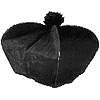| The above article is licensed under the GNU Free Documentation License. From Wikipedia, the free encyclopedia https://en.wikipedia.org/wiki/biretta 6/14/05 |
Hat Factories Hat Wholesalers Hat Retail Stores Definition List Fashion Industry News Fashion
Its origins are uncertain but is mentioned as early as the tenth century. The most probable origin of the biretta is the academic hat of the high middle ages, which was a soft, square cap. The medieval academic hat is also the ancestor of the modern mortarboard hat or 'dink' used today in secular universities.
Those worn by Cardinals are scarlet red made of silk, those by bishops are purple, while those worn by priests, deacons, and seminarians are black. The pope does not make use of the biretta, instead he makes use of the camauro. Variations in the color of the tuft of the priest's biretta denote differences in ecclesastical rank for canons, monsignori, etc. Additionally, the holding of certain academic degrees permit clerics the use of various colors of tufts and trim. In previous times, a biretta without peaks was worn by the clerical order of sub deacons. Birettas worn by cardinals, deacons, and seminarians do not have a tuft.
| Textile & Clothing definitions and Glossaries: | |
|
|
Clothing & Fashion Directory |
|||
|
Apparel Search is the worlds largest and fastest growing business to business database dedicated solely to the Clothing, Fashion & Textile Industry. Through the use of cutting edge technology, and a tremendous amount of "human" effort, we will continue to expand the Apparel Search directory. Our intention is to provide information regarding all aspects of clothing and fashion. If you know of any clothing, fashion, or textile related issue that is not currently listed on Apparel Search please let us know.
|
|||
| Discussion boards are a great place to meet other members of the fashion industry, get advice, and share information. This forum was created to discuss the topic of this page. If you have questions, or information to improve this page, please join in the community discussion below. Please keep the communication on topic and for the purpose of education. |
|
|

